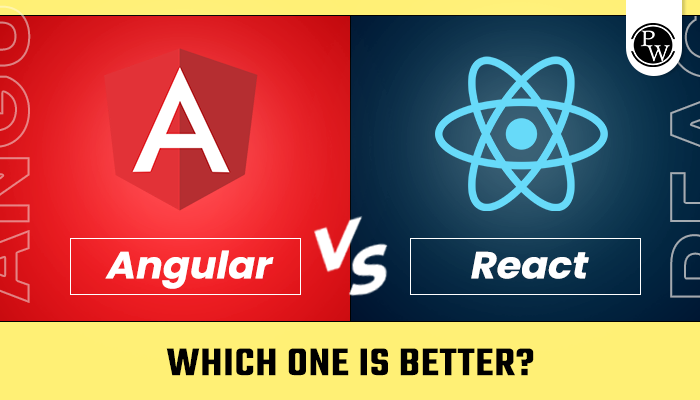Angular vs. React JavaScript has become the most widely used programming language for web application building. This is due to the increasing popularity of single-page applications (SPAs) and the rise of JavaScript frameworks and libraries. Two of the most popular JavaScript frameworks for building web applications
Angular JS and React are both powerful and widely used, but they have different approaches to building web applications. Both have their own strengths and weaknesses and the choice of which one to use depends on the specific needs of a project. Java course is one of the best job-oriented courses in the tech industry.
This article will comprehensively compare Angular and React and help you determine which is better for your project.
Angular vs React Java Script
Angular is a full-fledged framework for building web applications. Google developed it, and is one of the most popular frameworks for building SPAs. Angular vs React is a complete solution for building complex web applications and provides a comprehensive set of tools and features for building dynamic, interactive web applications.
Features
Angular provides a comprehensive set of features for building web applications. It includes:
- A powerful template language that allows developers to create dynamic, interactive web pages.
- Two-way data binding updates the view whenever the model changes and vice versa.
- A modular architecture that allows developers to create reusable components and modules.
- A robust set of built-in directives that allow developers to add custom behavior to their applications.
- A strong focus on testing and debugging, making it easy for developers to write and run tests for their applications.
- A rich set of tools for building animations, which are essential for creating engaging user experiences.
Pros
- Comprehensive solution: Angular is a full-fledged framework that provides comprehensive features for building web applications. It is ideal for building complex web applications that require a lot of features and functionality.
- Two-way data binding: Angular two-way data binding makes it easy for developers to create dynamic, interactive web pages. It ensures that the view is updated whenever the model changes and vice versa.
- Modular architecture: angular vs react modular architecture allows developers to create reusable components and modules. This makes it easier to maintain and update applications and reduces the amount of code that needs to be written.
- Built-in directives: angular vs. react provides a robust set of built-in directives that allow developers to add custom behavior to their applications. This makes it easier to create custom elements and provides a lot of flexibility for building web applications.
- Strong focus on testing: Angular has a strong focus on testing and debugging. This makes it easier for developers to write and run tests for their applications, which helps ensure that applications are stable and reliable.
Cons
- Steep learning curve: Angular has a steep learning curve, especially for developers who are new to web development. It takes some time to get familiar with Angular architecture and features.
- Complex syntax: Angular has a complex syntax, which can be challenging for developers who are new to web development.
- Heavy dependence on TypeScript: Angular heavily depends on TypeScript, a statically typed programming language built on top of JavaScript. This can be a challenge for developers who are used to working with JavaScript and are not familiar with TypeScript.
React js
React is a JavaScript library for building user interfaces. Facebook developed it, and is one of the most popular libraries for building web applications. React is designed to be fast and efficient and ideal for building large, complex web applications.
Features
- Familiar syntax: Reactjs’ use of JSX provides a familiar syntax for developers, which makes it easier to create dynamic and interactive user interfaces.
- Server-side rendering: React js ability to perform server-side rendering can improve the performance of applications and provide a better user experience.
- Large community: React has a large and active community of developers, which means there are a lot of resources and support available for developers using React.
Pros
- Virtual DOM: React uses a virtual DOM, which allows for efficient updates and rendering of components. This results in fast and smooth user experiences, even for complex applications.
- Components: React is based on the concept of components, which are reusable pieces of UI. This makes it easy to create reusable and modular UI elements, which helps to maintain and update applications more easily.
- JSX: React uses JSX, a syntax that allows developers to write HTML-like code in JavaScript. This provides a familiar syntax for developers and makes it easier to create dynamic and interactive user interfaces.
- Server-side rendering: React allows for server-side rendering, which can improve the performance of applications, especially for applications that are heavy on data.
- Strong focus on performance: React has a strong focus on performance and is designed to be fast and efficient. This makes it ideal for building complex web applications that need to handle large amounts of data and perform well on different devices.
- Large community: React has a large and active community of developers, which means there are a lot of resources and support available for developers using React.
Cons
Steep learning curve: React has a steep learning curve, especially for developers who are new to web development. Getting familiar with React\’s concepts and features takes some time.
Lack of a full-fledged framework: React is just a library for building user interfaces, and developers need to choose and integrate other libraries for additional features and functionality.
Complex state management: React does not provide a built-in solution for state management, which can make it challenging for developers to manage the state of their applications, especially for large and complex applications.
Conclusion
In conclusion, Angular and React are powerful and widely used to build web applications. Angular is a full-fledged framework that provides a comprehensive set of features for building web applications, but it has a steep learning curve and a complex syntax. React is a library for building user interfaces that are fast and efficient, but it lacks a full-fledged framework and can have complex state management.
The choice of which one to use depends on the specific needs of a project. For complex and feature-rich web applications, Angular may be a better choice. For fast and efficient user interfaces, React may be a better choice.
Ultimately, both Angular and React are excellent tools for building web applications, and the best one for a project depends on the specific requirements and goals of the project. Developers should consider their own skills, the requirements of the project, and the resources and support available when choosing between Angular and React.
Recommended Course
- Decode DSA with C++
- Full Stack Data Science Pro Course
- Java For Cloud Course
- Full Stack Web Development Course
- Data Analytics Course
FAQs
Q1: What is Angular JS?
A: Angular is a full-fledged JavaScript framework for building web applications. It provides comprehensive features and tools for building dynamic and interactive web applications.
Q2: What is React JS?
A: React is a JavaScript library for building user interfaces. It provides a set of tools and features for building fast and efficient user interfaces, but it does not provide a full-fledged framework like Angular.
Q3: What are the differences between Angular js and React js?
A: Angular is a full-fledged framework that provides a comprehensive set of features for building web applications, while React is a library for building user interfaces that is fast and efficient but lacks a full-fledged framework.
Q4: Which is better for building Angular or React web applications?
A: The choice between Angular and React depends on the specific needs of a project. For complex and feature-rich web applications, Angular may be a better choice. For fast and efficient user interfaces, React may be a better choice.
Q5: What are the advantages of using Angular?
A: Angular provides a comprehensive set of features for building web applications, a large and active community of developers, and a powerful set of tools for building dynamic and interactive web applications.
Q6: What are the advantages of using React?
A: React provides fast and efficient updates and rendering of components, a familiar syntax for developers, a focus on performance, and the ability to perform server-side rendering.
Recommended Reads
Data Science Interview Questions and Answers
Data Science Internship Programs





